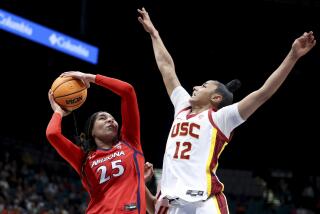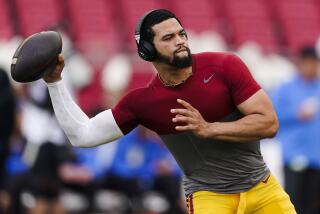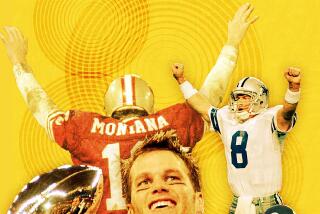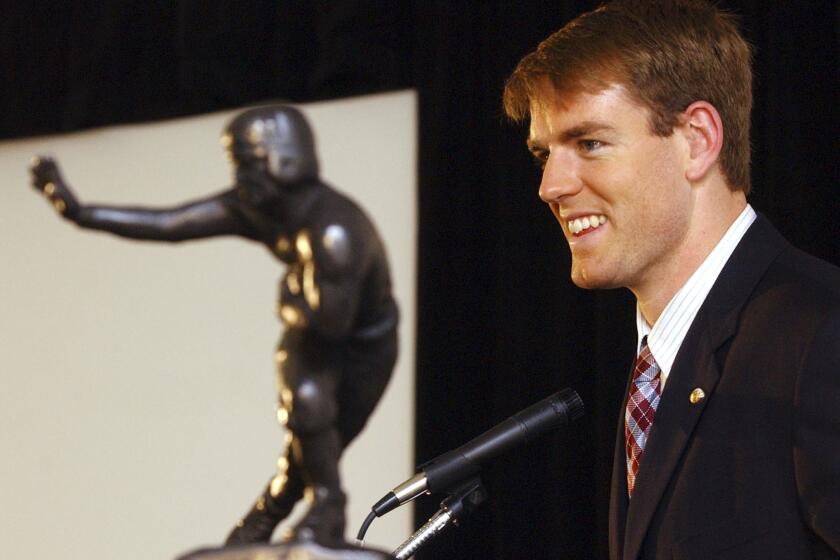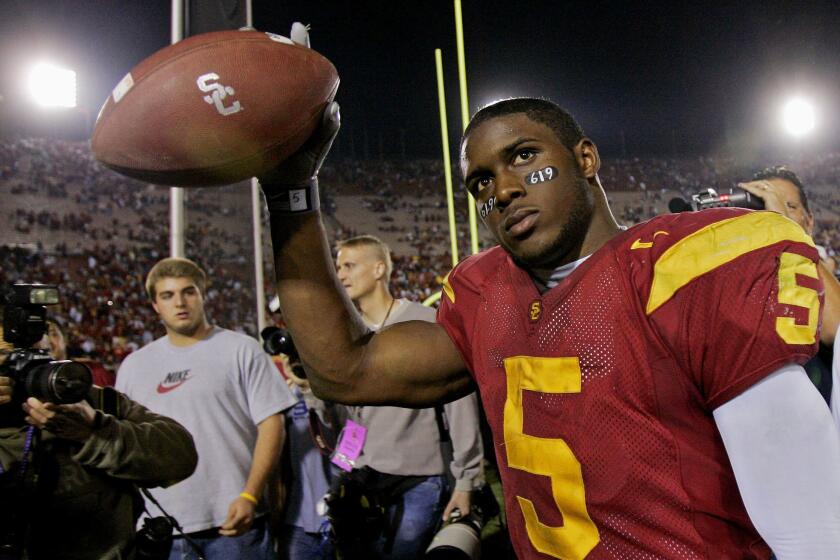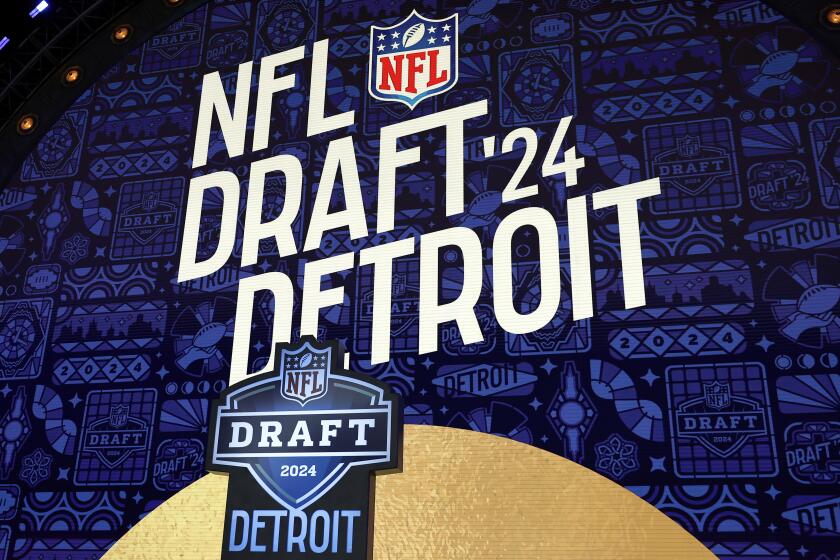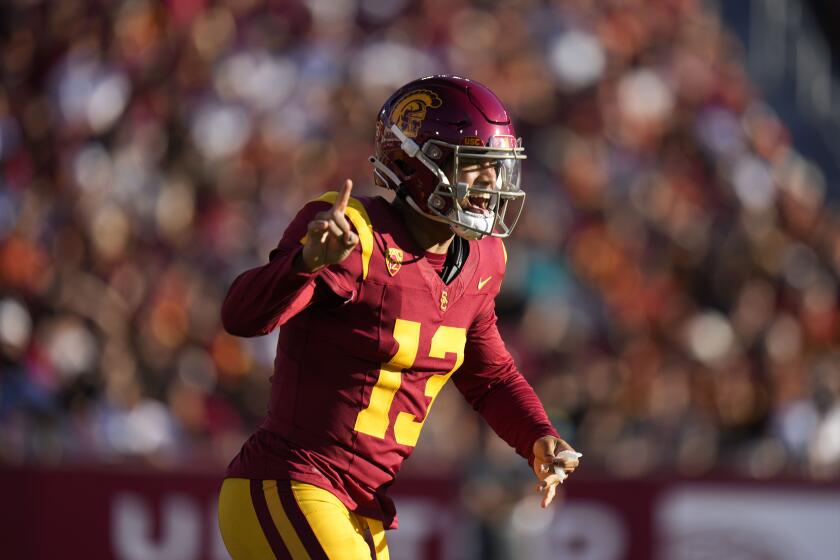Ex-USC QB Carson Palmer seeks satisfying career coda in Arizona
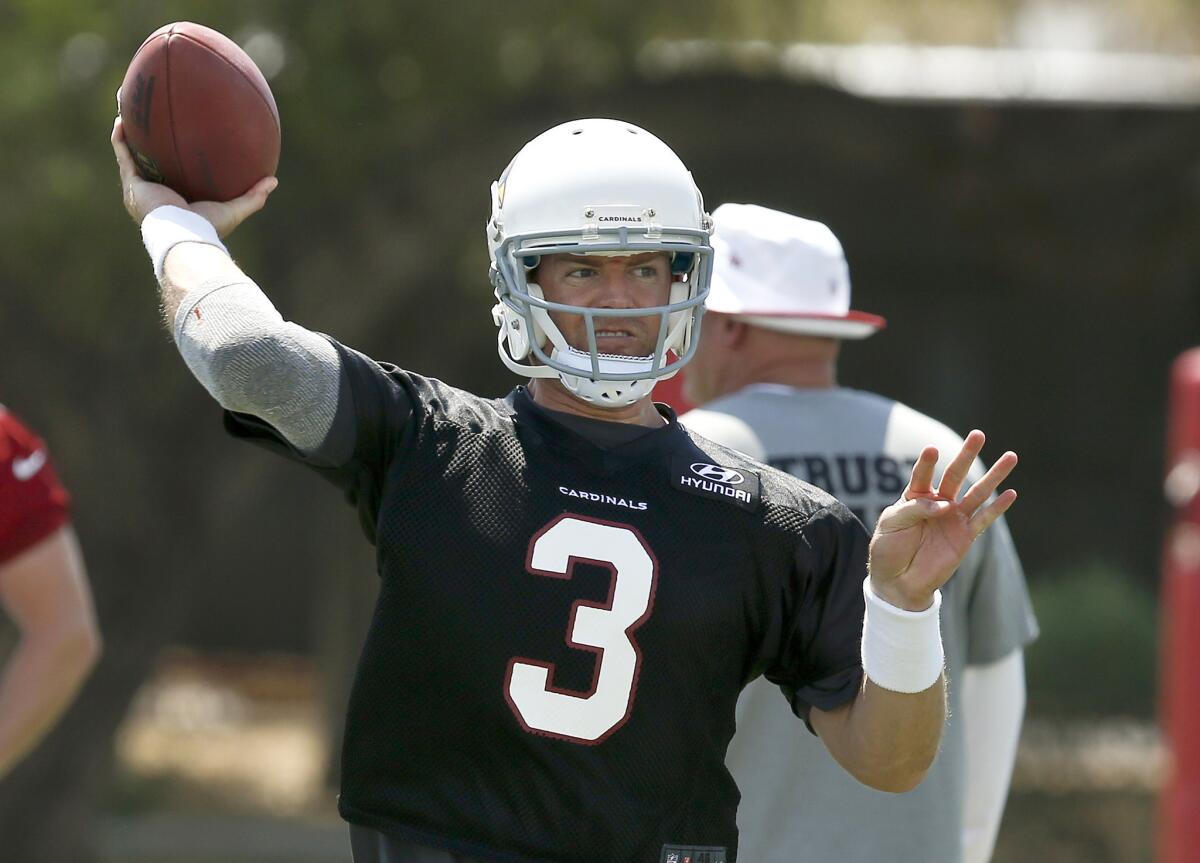
There is no hesitation from Carson Palmer, no hedging when asked to characterize his career as an NFL quarterback.
“Unfulfilled,” he said by phone from Arizona Cardinals mini-camp last week. “I’ve had a ton of experience. I’ve played in every type of situation. But to not have one run in the playoffs where you just make one of those magical runs? That’s what I want. I just want a chance to make one of those runs and see what happens.”
In their not-too-distant past the Cardinals had one of those, a quarterback in the twilight of his career carrying the team deep into the postseason. But that Kurt Warner-led march to the Super Bowl — at age 37 — was five years ago, and Arizona hasn’t been back to the playoffs since Warner retired after the 2009 season.
The players are different. The coaches are different. The NFC West is much different. And yet, Palmer, the former USC star traded from Oakland to Arizona last month, holds out hope that he and these Cardinals can replicate that type of success.
“I can’t help but look at what Kurt did,” said Palmer, 33. “He was later on in his career. It was a young team. He had made a couple other stops. . . . I can’t help but make that comparison.”
Of course, Warner had already won a Super Bowl and two most-valuable-player trophies by the time he got to Arizona in 2005, and Palmer makes no comparisons between his game and that of the undrafted-to-unbelievable Warner. Palmer, the No. 1 overall pick in 2003, is hoping only for similar success in the fourth quarter of his own career.
Palmer, in his 11th year in the league, has played in two postseason games, both with the Cincinnati Bengals. He suffered a gruesome knee injury on his only pass in a 2005 loss to Pittsburgh, and four years later, his Bengals lost in the first round to the New York Jets. It’s a resume that Palmer calls “very disappointing.”
“When you really think about it and look at the number of quarterbacks who come through the league, not many of them have Super Bowl careers,” he said. “It’s not like I’m going to look back and be depressed about it. I’m not going to be depressed about my career however it ends because I’ve met great people, I’ve played with great teammates, I’ve played for great coaches, and I’ve lived out a lifelong dream.
“But it wasn’t just about a dream of playing in the NFL. It was about a dream of playing in the NFL and winning Super Bowl rings. That’s where the unfulfilled part comes in.”
Even with a stable of inexperienced receivers, Palmer put up good numbers in 2012, his first full season with the Raiders. He completed 61.1% of his passes for 4,018 yards in 15 games, with 22 touchdowns and 14 interceptions. That didn’t translate into many victories, however, as the team finished 4-12.
The Raiders paid a high price to acquire Palmer during the 2011 season, sending Cincinnati a first-round pick in 2012, and a second-rounder in 2013. No one in Silver & Black was happy about how that deal panned out.
“Everything about that was bad timing,” Palmer said. “The passing of Al [Davis, the team’s longtime owner], all the salary-cap issues that we had last year and the year before, it was just bad for a veteran quarterback to come in.
“When it came down to it, I think they realized they’re a couple of years away from being contenders. They have so many salary-cap issues to clean up from the past. I think next year they’re going to be $30 million or $40 million under the cap, and they’re going to be ready to spend. It was time for them to go young and not put that money into a veteran quarterback.”
So the Raiders did go young, sending Palmer to the Cardinals for a pittance — essentially two late-round picks — and trading for Seattle backup Matt Flynn. And the move appears to be a good one for Palmer, who for the first time (other than a brief stint under Hue Jackson) will have a head coach who specializes in offense.
New Cardinals Coach Bruce Arians, who won coach-of-the-year honors with Indianapolis last season, has a robust record of success in working with quarterbacks, among them Peyton Manning, Ben Roethlisberger and Andrew Luck.
Arians was in Pittsburgh when Palmer played in Cincinnati, and the coach is confident in what he’s getting.
“The first thing I knew was he was tough, because we’d always go after him,” Arians said. “And you couldn’t faze him. He’s probably the best, prettiest deep-ball thrower I’ve played against. He can just drop it in the bucket every time.
“I was sold on the fact that if we can get this guy, he can turn this franchise around.”
It helps, of course, that the Cardinals have an All-Pro receiver in Larry Fitzgerald and two other promising young pass catchers in Andre Roberts and Michael Floyd, who will need to make significant contributions to keep defenses honest.
Palmer’s limited mobility is likely to be an issue for a team that surrendered a league-high 58 sacks last season, although he does get the ball out quickly, and the offensive line did get a boost with the addition of guard Jonathan Cooper, the No. 7 pick in April.
Palmer is heading into arguably the toughest division in football, especially in terms of defense. Then again, he was in a similar situation during his Cincinnati days, when everyone in the AFC North was stingy on that side of the ball.
“I’m coming into a really good situation,” he said. “A good team that may not have won the games they should have won last year, but still a good team.”
Arians sees parallels between his career and Palmer’s. At 60, he’s finally a non-interim NFL head coach and, like Palmer, aims to make Arizona the place he puts his signature on his legacy.
“It’s an old cowboy movie,” Arians said. “We’re going out to the desert, off in the sunset together.”
More to Read
Go beyond the scoreboard
Get the latest on L.A.'s teams in the daily Sports Report newsletter.
You may occasionally receive promotional content from the Los Angeles Times.
